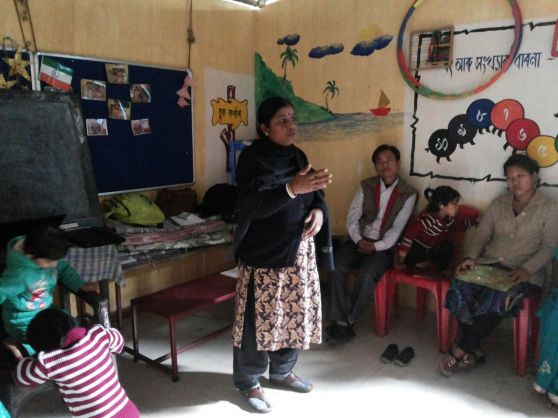
Bashona Debnath is a strong and confident woman, and a mother of three boys. Her eldest son, Biswajit, is 24 and works with VAANI in an administrative and accounting capacity. The middle one, Monojit, is 17 and is going to appear for his board exams. The youngest one, Parthajit is 13 and in class 7. Bashona works at VAANI as a parent trainer and role model. She speaks to groups of parents on deafness and how to deal with it and trains parents on how to communicate with their deaf children. But she wasn’t always this confident…
Bashona grew up in the Lanka block of the Nagaon district in Assam. She got married in 1989. A year after she had her second child, Monojit, she suspected that something could be wrong with him. He wasn’t responding to her when she would try to call him. She wondered what the matter was, but didn’t even suspect that it had something to do with his hearing. She took him to a homeopathic doctor who prescribed some medication. It had no effect on him. She then took him to an ENT specialist in Nagaon and had him checked. The doctor suspected hearing loss and said that she should get audiological tests done. But since she had financial problems she only ended up doing it six months later.
That is when she found out her son is deaf. The doctors advised her to get a hearing aid for her son and give him speech therapy. But it was still all too expensive. She began to feel helpless and didn’t know what steps to take next.
A few years later Bashona had her third son, Parthajit. When he was six months old he began uttering “da-da” and “ba-ba”. She thought this would mean that he wouldn’t have any hearing problems. But just to be sure, when he was 9 months old, she tried calling Parthajit while standing behind him. He wouldn’t respond. She then took him to the ENT specialist in Nagaon. As fate had it, Bashona’s third son got the same diagnosis as well. They heard about a treatment that was being done all the way in far Vellore, Tamil Nadu and rushed their sons there. On reaching there, they learned that even with an operation, hearing couldn’t be guaranteed. With shattered hopes they returned to Assam. Her second son was refused admission into 5th standard because the teachers had no idea what to do with him. Bashona felt even more helpless.
She and her family then moved to Guwahati so that Monojit could be schooled at the Government Deaf School. Soon they called for a parents meeting and at that meeting she heard Ajita Gohain from VAANI speak. Bashona heard about all the work that was being done at VAANI for deaf kids and their families, and made sure she and her husband found out everything they needed to know. She then attended every meeting and workshop without fail and began to realise how much could be done for her sons. Slowly, she dared to be confident, and have great hopes for her children. Today, both her deaf sons can communicate well and read and write without any difficulty. They too have grown up to be confident.
A few years later Bashona decided she needed to involve herself more, and began working with VAANI. Here’s what she has to say:
“Parents of deaf children feel helpless just like I did when I first found out about my child’s deafness. I choose to work with VAANI because they focus equally on the parent’s involvement and wellbeing. I hope new parents of deaf children do not face the same difficulties that I faced. VAANI has given me and my sons confidence and I want to share the knowledge with other parents”
“As a new mother of a deaf child I felt very helpless and had lost all hope for my sons. After coming across VAANI and working with the team here I have realised that inspite of my limited education, I learnt a lot and have become very confident in my abilities. I have been well trained by the entire VAANI team to know how to speak in a group and how to support children and parents during training sessions. This has been my inspiration to do even more for more parents.”
“I would like to tell other parents not to lose any hope, but instead try and give as much time as they can to communicate with their children and learn the techniques of providing academic support as well.”
